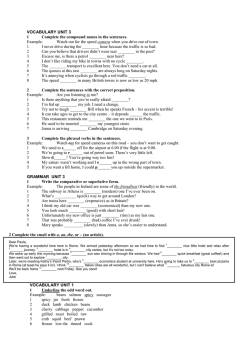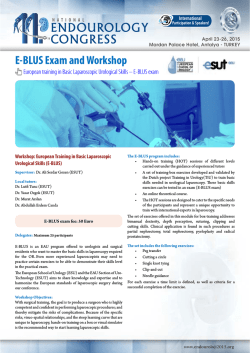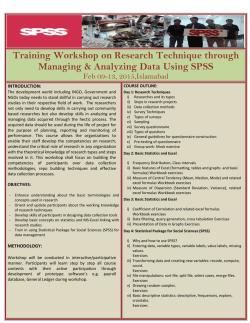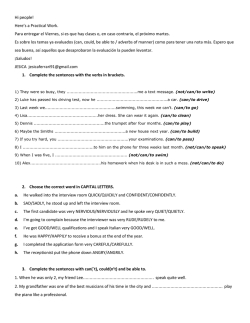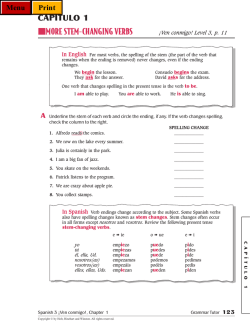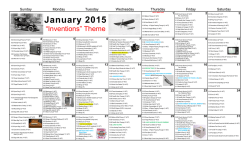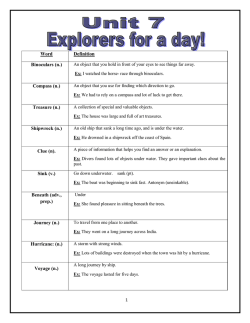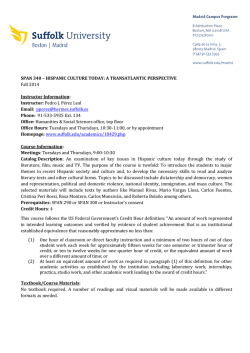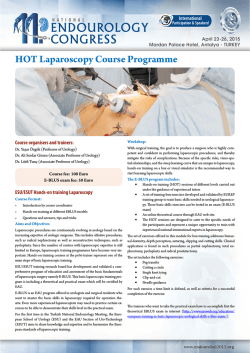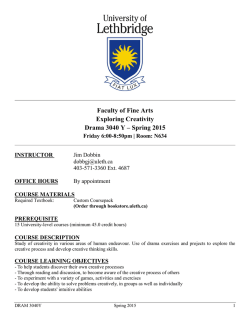
oll 233 course outlines 2014/2015
THE OPEN UNIVERSITY OF TANZANIA Faculty of Arts and Social Sciences P.O. Box 23409 Tel: 255-22-2668820/2668992-Ext.2115 Dar Es Salaam Fax: 255-22-2668759 http://www.out.ac.tz Direct Line: 022 - 2667255 E-Mail: [email protected] OLL 233 COURSE OUTLINES 2014/2015 LECTURE 1: FOUNDATIONAL ISSUES Prescriptive versus descriptive grammar Rule formation in language acquisition o A thought experiment o Rule-based word formation o Question formation More evidence for syntactic structure o Intuitions about words belonging together o Structural ambiguity Universal Grammar Formal universals Recursion Parameters Generative grammar Elementary trees and substitution o Grammaticality o Grammar versus language Notes Exercises and problems Supplementary 1 LECTURE 2: SYNTACTIC CONSTITUENTHOOD • Tests for constituenthood o Substitution o Movement o Questions and sentence fragments o It cleft focus • Some complications o Mismatches between syntax and prosody o Phrasal versus lexical constituents o Verb phrases • Representing constituenthood • Notes • Exercises and problems • Supplementary material o Node relations o Verb forms and finiteness in English LECTURE 3: SOME BASIC LINGUISTIC RELATIONS • Argumenthood o Semantic valency o Transitivity • Modification • Predication o Expletive it o Aristotelian versus Fregean predicates o Expletive there o Some special cases • Notes • Exercises and problems • Supplementary material o Grammatical relations o Reference and related notions o Thematic roles o Verb forms and finiteness in English LECTURE 4:INTRODUCING THE X' SCHEMA OF PHRASE STRUCTURE • The X' schema for elementary trees o Transitive elementary trees o The X' schema o Intransitive elementary trees o Deriving simple sentences o Deriving complex sentences • The adjunct relation o Modification is different o The need for an adjunction operation o A typology of syntactic dependents 2 o More on the distinction between complements and adjuncts • Notes • Exercises and problems • Supplementary material o Modals and auxiliary verbs in English o Reference and related notions o Thematic roles LECTURE 5: EXTENDING THE X' SCHEMA • Noun phrases o Parallels and differences between noun phrases and sentences o Noun phrases as DPs o More on determiners o Modification and related issues • Adjective phrases • Prepositional phrases • Crosslinguistic variation in headedness • Notes • Exercises and problems • Supplementary material o Nouns LECTURE 6: THE VERB MOVEMENT PARAMETER • Verb raising: V movement to I o The French future tense o The order of adverbs and verbs in French • Tense lowering: I movement to V o The order of adverbs and verbs in English o Do support in English • Cues for the acquisition of verb raising • Verb raising and related issues in the history of English o The loss of verb raising o A change in the status of not o The emergence of do support o The emergence of modals o Remnants of verb raising in modern English • Notes • Exercises and problems • Supplementary material o Modals and auxiliary verbs in English o Node relations LECTURE 7: VP SHELLS • Double-object sentences o The structure of ordinary causative sentences o Parallels between causative sentences and double-object sentences o Abstract verb movement 3 • Double-complement sentences o Give and send o Put o Persuade • The causative alternation o Manner of motion verbs o Get • Further issues o Locality constraints on idioms o Small clauses revisited • Notes • Exercises and problems • Supplementary material o Thematic roles LECTURE 8: CASE THEORY • A first look at case o The basic purpose of case o Case government o Synthetic versus analytic case marking • Case features • Case licensing o Spec-head licensing o Head-spec licensing o Head-comp licensing o Nonstructural conditions on case licensing o The dative-accusative distinction • Case agreement (coming eventually...) • Notes • Exercises and problems • Supplementary material o Grammatical relations LECTURE 9: NONFINITE CLAUSAL COMPLEMENTS • Selectional restrictions • Subject control o Evidence for two clauses o Deriving subject control sentences • Raising o A detour o Nonthematic subject positions o Deriving raising sentences o Tend and occur o Promise • Object control • More nonthematic subjects o Subject idiom chunks 4 o Weather it o Summary • Notes • Exercises and problems LECTURE 10: PASSIVE • Characteristics of the passive • A movement analysis of the passive o Object idiom chunks o Analysis • The passive and nonfinite complementation • The passive and VP shell constructions • Exercises and problems LECTURE 11: WH- MOVEMENT • Evidence for a movement analysis of questions o Complementation o Why a silent complementizer? o Case checking o Direct wh- questions • The island constraints o The apparent unboundedness of wh- movement o A typology of islands • Other instances of wh- movement o Wh- relative clauses o That relative clauses o Doubly marked relative clauses o Zero relative clauses o Topicalization • Notes • Exercises and problems • Supplementary material o Questions LECTURE 12: WH- MOVEMENT: SUBJACENCY AND THE ECP • Subjacency o Two possible derivations for long-distance wh- movement o IP as a barrier to wh- movement o DP as a barrier to wh- movement o The coordinate structure constraint revisited • The Empty Category Principle (ECP) o Antecedent government o Lexical government • Further issues and refinements o Is subjacency an independent principle? 5 o Movement out of ECM complements o Movement out of DP • Exercises and problems • Supplementary material o Node relations LECTURE 13: THE VERB-SECOND (V2) PHENOMENON • V2 in German o The linear position of the finite verb o The structural position of the finite verb o Movement to C as adjunction o Verb movement to C in declaratives • V2 in the history of English o V2 in Middle English o A remnant of V2 in modern English • Notes • Exercises and problems LECTURE 14: BINDING THEORY: SYNTACTIC CONSTRAINTS ON THE INTERPRETATION OF NOUN PHRASES • Coreference and coindexing • Hellan 1988 o The co-argument condition o The predication condition o The tensed IP condition o Strict vs. non-strict co-arguments • Extending Hellan's binding theory to English o The co-argument condition o The predication condition o The tensed IP condition • Chomsky 1981 o Principle A o Principle B o Principle C • Notes • Exercises and problems (to be added) 6
© Copyright 2026

